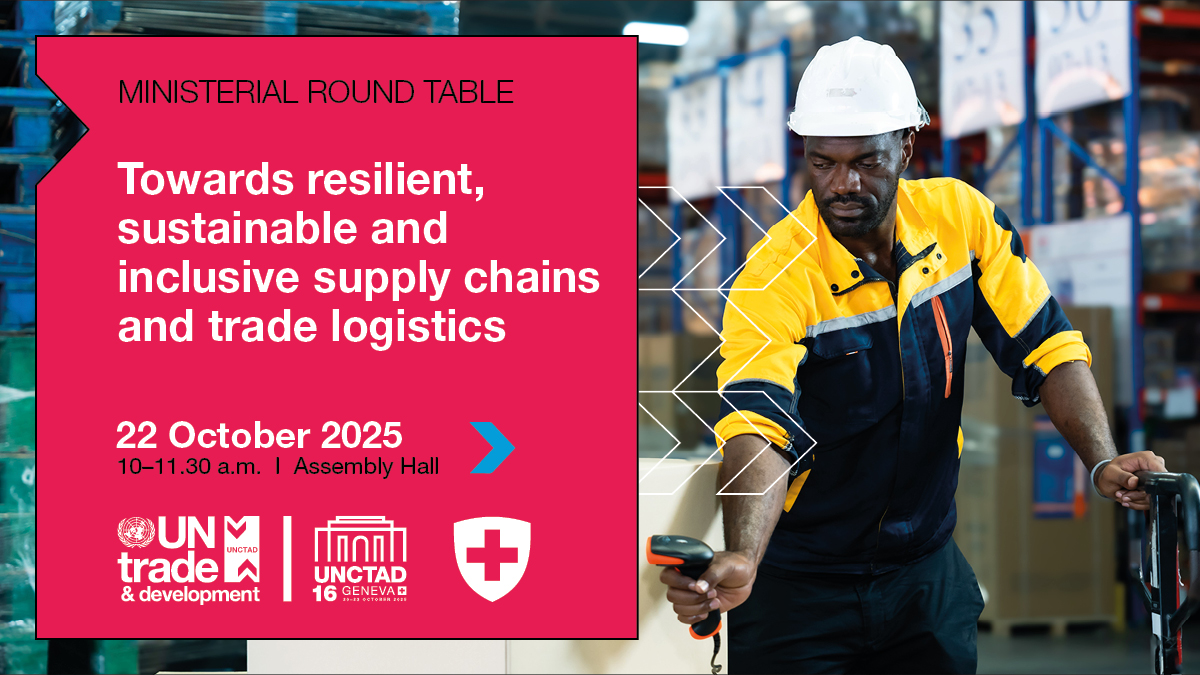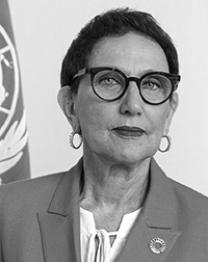
Regional and global supply chains are increasingly exposed to disruptions stemming from diverse factors, including pandemics, geopolitical developments, shifting trade policies and climate-driven extreme weather events. These disruptions present significant challenges for trade, transport and logistics systems, with far- reaching implications for the sustainable development prospects of the most vulnerable developing countries. Concerted and collaborative efforts and response measures, such as improved coordination, investment in sustainable and resilient transport infrastructure, strengthened policy support and trade facilitation are needed to mitigate and respond and adapt to disruptions, ensuring that supply chains are sustainable, inclusive and resilient for the future.
Discussions at this round table will address key challenges and potential solutions and opportunities; and identify policy priorities for enhancing supply chain resilience and sustainability in developing countries. They may inform discussions at the second Global Supply Chain Forum, to be held in Saudi Arabia in 2026, in collaboration with the Saudi Ports Authority.
Programme
Opening remarks: Rebeca Grynspan, Secretary-General, UNCTAD
Panel 1: Key challenges and potential solutions and opportunities
Questions
- What are the key challenges for developing countries, landlocked developing countries, the least developed countries and small island developing States arising from recent disruptions in global and regional supply chains, from pandemics, geopolitical tensions and/or climate-related events, and what lessons have emerged regarding future preparedness?
- Which policy priorities should be advanced in order to strengthen supply chain resilience and sustainability in these countries and how can UNCTAD and the international community provide more effective support towards sustainable, inclusive and resilient supply chains and trade logistics? Looking ahead to the second Global Supply Chain Forum in 2026, what are some thematic priorities for consideration?
Panel 2: Policy priorities for enhancing supply chain resilience and sustainability in developing countries
Questions
- Which concrete strategies or innovative approaches and/or practices are needed to reduce the impact of disruptions on transport and trade logistics systems and to enhance the resilience and sustainability of supply chains?
- How can UNCTAD assist developing countries in strengthening transport and trade logistics systems and related policy frameworks, to facilitate sustainable, resilient and inclusive supply chains in the future? Looking ahead to the second Global Supply Chain Forum in 2026, what are some thematic priorities for consideration?
Moderator: To be determined
Format: Davos-style
Rebeca Grynspan, of Costa Rica, became UNCTAD's eighth Secretary-General on 13 September 2021 and is the first woman to lead the organization.
Prior to her UNCTAD appointment, she was the Ibero-American secretary-general from 2014 to 2021, also the first woman to head the organization. During her mandate, she has coordinated the 22-member Iberoamerican Conference and led four key summits of Heads of State and Government.
In 2010 she was appointed Under-Secretary-General of the United Nations and Associate Administrator of the United Nations Development Program (UNDP) and prior to that was UNDP Regional Director for Latin America and the Caribbean.
Prior to joining the United Nations, Ms. Grynspan served as Vice-President of Costa Rica from 1994 to 1998. She was also Minister of Housing, Minister Coordinator of Economic and Social Affairs, and Deputy Minister of Finance. In 2021 she was named Special International Advisor to the newly created Economic and Social Council of Argentina and invited to join as member of the G20 High-Level Independent Panel on Financing the Global Commons for Pandemic Preparedness and Response.
In addition to her experience as a lecturer and advisor to several international organizations, she has been actively involved in key United Nations initiatives, such as the Millennium Project's Task Force on Poverty and Economic Development and the High-level Panel on Financing for Development.
In 2014 and 2015, she was recognized as one of the 50 leading intellectuals of Latin America. And she was recognized as one of the 100 most powerful women in Central America by Forbes magazine.
Ms Grynspan holds a degree in Economics by the University of Costa Rica and a MSc in Economics by the University of Sussex. She has been awarded a Doctorate Honoris Causa by the University of Salamanca, the University of Extremadura and the European University of Madrid in recognition of her outstanding professional achievements.



